Protests erupt in Iran after woman dies in police custody after breaking hijab law
President Ebrahim Raisi has ordered an inquiry into the case.
Thousands of men and women have taken to the streets in Iran after a woman, who was arrested for breaking hijab laws, died in police custody last week.
The protests against Mahsa Amini's death have now been continuing for more than four days, and have reached several cities and towns. The 22-year-old woman was on a visit to Tehran when she was detained by Iran's morality police, responsible for enforcing its rigid dress code.
The woman was detained for allegedly breaking hijab rules. According to witnesses, Amini was thrashed while being taken to a detention centre. Some reports claimed that the police hit her head with a baton, and banged it against one of their vehicles.
In Kerman's Azadi Square tonight, a woman sits on top of a utility box, takes off her headscarf and cuts her hair as people chant "death to the dictator" on the fifth night of protests in Iran over the death of #MahsaAmini in custody of morality police.pic.twitter.com/3zZuZkkom1
— Shayan Sardarizadeh (@Shayan86) September 20, 2022
On day 3, several cities have joined anti-regime protests, including the city of #Divandareh, #Mahsa_Amini pic.twitter.com/qhNDtu81t4
— Rana Rahimpour (@ranarahimpour) September 19, 2022
Amini died after falling into a coma following her detention by the morality police. The police, however, have maintained that she suffered a heart attack. Her family has rejected all these claims saying that she was perfectly fit and healthy.
Her death has sparked protests all across Iran with women at the helm of these demonstrations. Women have been burning their headscarves in the streets of Iran as a mark of protest against the country's regressive laws.
The protests started in her hometown in Saqqez, Kurdistan, where three people were killed on Monday after security forces opened fire on protesters.
The United Nations has demanded an independent investigation into Amini's death, per a report in Aljazeera.
"Mahsa Amini's tragic death and allegations of torture and ill-treatment must be promptly, impartially and effectively investigated by an independent competent authority," said Acting UN High Commissioner for Human Rights Nada Al-Nashif.
Cultural restrictions have been a regular feature of Iranian life since the 1979 Islamic revolution. The state's morality police roam the streets and have the right to arrest women who are not wearing a hijab and detain men with unconventional hairstyles.
The mandatory dress code requires women to cover their hair and neck with a headscarf. The morality police formally called "Gasht-e Ershad" (Guidance Patrols) have the power to stop and detain women who they think are not properly dressed.
In recent years, women have begun to protest the strict dress code by posting images of themselves with their hair uncovered on social media with the hashtag #whitewednesdays.
The campaign sees women in Iran wearing a white piece of clothing as a symbol of protest against veil laws. However, successive governments in Iran have refused to give in and ease moral restrictions placed on men and women.

© Copyright IBTimes 2025. All rights reserved.






















